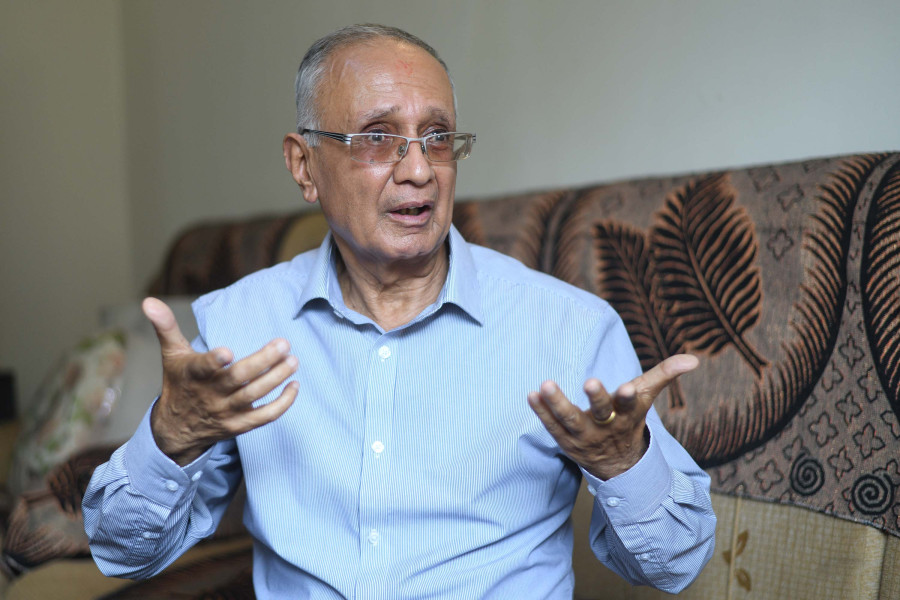Interviews
GSI confusion seems rooted in incompetence of Nepali interpreters
Nepal should not be surprised if Japan decides to reduce its development assistance following KP Oli’s decision to attend the anti-Japan parade.
Biken K Dawadi
Prime Minister KP Sharma Oli’s recent China visit, where he attended the Shanghai Cooperation Organisation (SCO) Summit and an ‘anti-Japan’ parade, sparked some controversy. There were contradictory interpretations of his bilateral meeting with Chinese President Xi Jinping on the sidelines of the summit. Observers also questioned PM Oli’s decision to attend the parade seemingly targeted against an old friend. The Post’s Biken K Dawadi sat down with the general secretary of China Study Centre in Kathmandu, Upendra Gautam, an old China hand, for insights.
To start with, as someone who closely observes and interacts with Chinese leaders and bureaucrats, what are China’s evolving interests in Nepal?
The Communist Party of China (CPC), which established the People’s Republic of China (PRC), prioritises political stability through ideological continuity on a scale incomparable with any other political institution across the globe. As compared to China, Nepal has a history of political instability, concerning government and policy, which is reflected in Nepal’s foreign policy. As China sees any foreign nation through a long-term lens, Nepal is perceived as a politically volatile neighbour.
Nepal stands as a buffer between India and China. As the pioneer Nepali diplomat Yadu Nath Khanal notes, “The core interest of China in Nepal is its independence and ensuring that Nepal does not fall victim to foreign interference.” The Chinese do not have a range of ulterior motives concerning Nepal. They do not want Nepal’s territory to be used against China. They do not want Nepal to be weakened by foreign interference. They want Nepal to maintain strong border security with India with a sense of independence.
Let’s come to the SCO. How do you analyse Nepal’s role in the organisation? Should the country even be its part?
The SCO is an evolution of the Shanghai Five, a group of five Central Asian countries, which was transformed into a multilateral forum with additional member states in 2001, with newly prioritised agendas of interstate security, anti-terrorism, trade and cultural similarity. Nepal’s interest in the organisation dates back at least to the time of Girija Prasad Koirala in 2003, when there were discussions on membership of the SCO. In 2016, we officially became a dialogue partner of the organisation by signing an MoU with the SCO secretariat. Today, the roles that countries play in the organisation have been reduced to two now: Partner and Member. Nepal is a partner of the SCO.
With the reduced relevance of Saarc and Bimstec, Nepal needs to be involved in other multilateral forums to secure its regional interests, and the SCO is a great platform with significant visibility across the continent. So, Nepal definitely needs to be a part of the SCO.
However, we do not need Member status to hold and take part in bilateral and multilateral meetings through the SCO. As a partner, we can still hold meetings like PM Oli did with President Xi Jinping and Russian President Vladimir Putin. We can use our partner status and use the SCO as a channel to increase our understanding of the region and foster international cooperation. But for that, we need to do our homework before such meetings.
How did you see Oli’s bilateral meeting with Xi and the raising of the Lipulekh issue by the Nepali prime minister?
Again, we need to do our homework. Oli seemed to have simply complained about being ‘bullied’ by India. But it would be blatantly wrong to say China is not involved in the issue. I would say our framing of the issue was wrong as it failed to highlight China’s involvement.
How then should we have framed the issue?
The 1961 border treaty between Nepal and China recognises the disputed area as a trijunction between Nepal, China and India. With proper homework, we could have framed the issue as one concerning all three countries and pushed for a trilateral meeting between the three countries as an agenda item during the bilateral talk between Oli and Xi.
Wasn’t it wrong of China to first accept Nepal’s updated map in 2020 and then sign the recent agreement with India to reopen Lipulekh?
Every modern nation-state is involved in a cartographic war with its neighbours. There is no practice of a third country rejecting a unilateral publication of a map when it courts controversy between two countries [Nepal and India in this case], when it does not serve its interests. Even if they express opposition to such a publication, what is the relevance? So when China accepted Nepal’s updated map in 2020, it did not imply that they did not have grievances with the map.
Every state needs to secure its interests in this neo-realist world. China did so by agreeing to reopen the trade route through the Lipulekh pass. We need not antagonise China when it is simply looking out for its interests, same as we should not be antagonised by any other country when we make a move to secure our interests.
Has China finally opened up about its aspirations to lead a new world order through the summit? What is the Chinese approach to redefining the world order?
China seeks to position itself as the second superpower in a bipolar world. With the heightened ineffectiveness of the United Nations (UN), the realisation of its aspiration could be facilitated by alternative multilateral forums such as BRICS and SCO.
The Chinese approach to redefining the world order is marked by patience and pragmatism. China accepts the fact that it will not be able to emerge as the prominent superpower overnight. This move has been carefully planned out.
The China Council for International Cooperation on Environment and Development (CCICED)’s increased funding for developing countries has slowly redefined China as a state with a vested interest in global development. Add to it the initiatives such as the Belt and Road Initiative (BRI) and the recently proposed Global Development Initiative (GDI), Global Security Initiative (GSI) and Global Civilisation Initiative (GCI), and China has started to take the lead in building a new order.
The Oli-Xi meeting courted controversy after the Chinese side claimed that Oli had expressed support for the GSI, followed by Nepal rebuking the claim. What do you think was the root of the confusion?
The GSI involves military involvement and coordination. We have no military capability to contribute to such an initiative. We also don’t need military support to secure our interests. Therefore, Nepal neither has the need nor the desire to be involved in or support the GSI. In addition, the agenda of supporting the GSI cannot be decided in a single meeting. We do not even understand the implications of supporting such an initiative.
The Chinese side places high importance on linguistic interpretation, with only the most intelligent individuals selected for the role. How many of the interpreters in the Nepali delegation are truly well-versed in Mandarin? How well did our delegation understand the content of what Xi said during the meeting?
Mind you, the Chinese language is highly refined, with even body language having an impact on the meaning of phrases. The root of the confusion seems to be the incompetence of Nepali interpreters. Perhaps our interpreters misinterpreted what Xi said about the GSI and Oli, clueless about the misinterpretation, nodded as a reflex, which was interpreted by the Chinese side as support for the GSI.
How will Oli’s decision to attend the ‘Victory of the Chinese People’s War of Resistance against Japanese Aggression’ impact Nepal-Japan relations?
The parade in question is organised by China once every 10 years. The Chinese interest is to galvanise international support through the parade. The attendees of the SCO summit were not compelled to attend the parade. Oli decided to partake in an optional event. In fact, Japan made an international appeal to friendly states not to send delegates to attend the parade.
We have longstanding diplomatic ties with Japan, with the country continuously supporting Nepal’s development through financial assistance. The Japanese cabinet holds a meeting twice a year to review the development assistance it provides to its friendly states. Oli’s move to attend the parade means that we are now walking on a tight rope regarding our relationship with Japan. We cannot act surprised if Japan decides to reduce its development assistance to Nepal.
How can Nepal emerge from this controversy unscathed?
It will be hard. Nepal-Japan relationship will certainly sour, but we need to focus on damage control. We need the assistance that Japan provides. For this, we need to take the Japanese into confidence. We should not take our existing relationship for granted. Rather, we must take responsibility for the decision to attend the parade and initiate dialogue to ensure that our friendly relations continue.




 24.71°C Kathmandu
24.71°C Kathmandu












